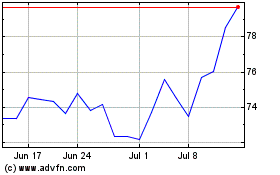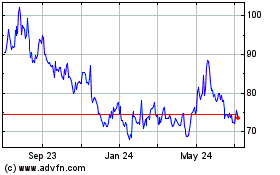By Stella Yifan Xie and Serena Ng
This article is being republished as part of our daily
reproduction of WSJ.com articles that also appeared in the U.S.
print edition of The Wall Street Journal (July 21, 2020).
HONG KONG -- Ant Group Co., the Chinese technology and
financial-services giant that owns popular mobile-payments network
Alipay, said it is planning initial public offerings in Hong Kong
and Shanghai, bypassing New York as it seeks to accelerate its
growth in China and abroad.
The Hangzhou-based company, which was founded by billionaire
Jack Ma and is one of the world's most valuable startups, said it
is targeting concurrent listings on China's year-old, Nasdaq-like
STAR market for homegrown technology companies and Hong Kong's
stock exchange.
Ant is moving to list closer to home while tensions flare
between the U.S. and China, including threats of sanctions on
Chinese officials and delisting Chinese firms from U.S. stock
exchanges. Back in 2014, e-commerce giant Alibaba Group Holding
Ltd. -- from which Ant's flagship Alipay business was spun out of
-- chose New York as its listing venue and raised $25 billion. It
was the world's largest IPO until Saudi Aramco's listing last
year.
Ant didn't give a time frame for its IPOs or a fundraising
target, but a person familiar with the matter said the company is
aiming for a market valuation exceeding $200 billion and hoping to
list later this year. The combined stock offering could be one of
the largest in history, as companies generally sell at least 10% to
15% of their shares when they go public.
Ant was last valued at $150 billion in a private fundraising
round in mid-2018 that raised around $14 billion from a combination
of domestic and international investors.
Since then, several holders of Ant's shares, including funds
managed by BlackRock Inc., have marked up the value of their
investments, according to regulatory filings.
Ant said going public will help it "accelerate its goal of
digitizing the service industry in China," position the company to
expand with partners globally and enable it to invest further in
technology and innovation.
Its executive chairman Eric Jing also said the listing would
also help the development of Shanghai's STAR market as well as the
stock exchange of Hong Kong by drawing global investors to
companies listed on those bourses. "We are thrilled to have the
opportunity to play a part in this development," he added.
Ant, which is profitable, has long been tight-lipped about its
listing plans. Unlike Alibaba and most of China's most valuable
technology players that have holding companies incorporated in
offshore jurisdictions like the Cayman Islands, Ant is domiciled in
mainland China and needs the blessing of Chinese regulators to list
its shares in other markets.
Its latest plans come at an important juncture for both Hong
Kong and China, which is locked in a dispute with the U.S. over
Beijing's tightening grip over the Asian financial hub.
Last month, China imposed a new national-security law on Hong
Kong that is designed to curb dissent and quell pro-democracy
protests by criminalizing secessionist, subversive and terrorist
activities in the former British colony. The Trump administration
has condemned the move and said it would impose sanctions on
officials and entities that have contributed to the erosion of Hong
Kong's autonomy.
Earlier this year, the Senate passed legislation that would
force U.S.-listed Chinese companies to delist from American stock
exchanges if their audit work papers aren't inspected by U.S.
regulators for three consecutive years. The bill must pass the
House before it can become law.
Ant's listing would draw more global investors to Hong Kong, and
make mainland Chinese companies an even larger part of the city's
$5 trillion stock market. Many U.S. money managers already hold
Hong Kong-listed stocks, and some retail brokers also let
individual investors in the U.S. trade shares on the city's
bourse.
Last year, Alibaba added a secondary listing in Hong Kong and
raised $13 billion from investors. Its move followed listing rule
changes that made it possible for companies with weighted voting
rights to list in the city. Alibaba's market capitalization is now
around $660 billion, according to FactSet, nearly four times what
it was when the company went public in 2014.
"Ant Group is an important member of the Alibaba digital economy
and we believe Ant's listing plan will be beneficial to its future
growth, creating value for its users, partners and shareholders,"
Alibaba said in a statement on Monday. The company currently owns
33% of Ant's shares.
Alipay, which grew out of a digital payments system on Alibaba's
e-commerce websites, now has more than 900 million active users in
China who use its mobile app for everything from online investing
to paying for groceries and utility bills.
Ant used to be known as Ant Financial Services Group before it
changed its name last month. It said it wanted to be known simply
as Ant Group, to reflect a shift in its strategy toward providing
technology to financial institutions and other businesses.
The company also has large small-business and consumer lending
units and operates a private credit-scoring business. It manages
one of the world's largest money-market mutual funds, which is sold
along with dozens of other mutual funds on a popular investment
platform integrated with its Alipay mobile app.
Outside of China, Ant has investments in mobile payments
startups in other countries, including India's Paytm, and payment
processing tie-ups with overseas banks and retailers. Ant in 2017
tried to buy U.S. money-transfer company MoneyGram International
Inc. for $1.2 billion, but the deal was scuttled by a U.S.
national-security panel.
Hao Hong, a managing director and head of research at Bocom
International in Hong Kong, said Ant's plan to list in the city
will make it easier for international investors to profit from
selling their stakes in the company. He said Ant could fetch a
higher valuation on mainland China's A-share market, given a
historical gap in valuations on stocks listed on both bourses.
Virtually all IPOs on China's fledgling STAR market, which is also
known as the Science and Technology Innovation Board, have also
surged upon listing.
"Now may be the best time for Ant to go public as investors'
enthusiasm has been the highest since 2015," said Mr. Hong, adding
that waiting longer could subject the company to higher
geopolitical risk as tensions between the U.S. and China rise.
Write to Stella Yifan Xie at stella.xie@wsj.com and Serena Ng at
serena.ng@wsj.com
(END) Dow Jones Newswires
July 21, 2020 02:47 ET (06:47 GMT)
Copyright (c) 2020 Dow Jones & Company, Inc.
Alibaba (NYSE:BABA)
Historical Stock Chart
From Mar 2024 to Apr 2024

Alibaba (NYSE:BABA)
Historical Stock Chart
From Apr 2023 to Apr 2024
